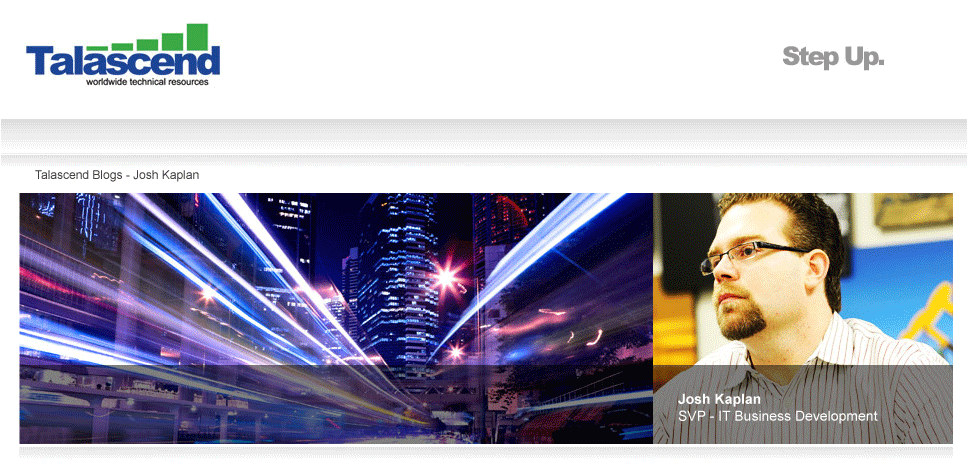 |
| Can technological distractions ruin an event or conversation? Photo by Moses - (The Crowd For DMB 2) |
So there I am perusing through LinkedIn, not only looking
for the next best candidate but also looking for topics to discuss and relevant
industry news. Then I happen upon not a blog, but a very humbling post on my
feed.
What's the all encompassing message of the feed? Bluntly
stated, 'You are not paying attention! Turn off your phone or Skype and pay
attention to me!' This LinkedIn
post about distractions technology creates really hit home, at least on a
professional basis. I try to separate my personal time from my private,
family time at present.
However, I may find myself in a meeting and, for 90% of
the discussion, I am intently listening to the speakers. Then, in comes the important
message I have been waiting on. I go on to miss 10% of what's being said while responding.
Could I have missed something important? What if I completely missed an
important question or a call for advice from one of my IT staffing team members
or a fellow executive? I am certain it has happened.
The days of a working 9-5 in front of a desk, divided by
non-work time where you are uninterrupted, are no longer. A colleague recently posted a blog on this
very subject of this 'very
tough question for the future of work' where he delves into fragmented work
days and what actually constitutes work.
Both articles offer such great insight into how technology is affecting the way we live.
Maybe instead of my smart phone saying slide to 'unlock,' it should say, 'slide to confirm you are not showing
someone they aren’t important enough for your full attention.'
I’m an offender of this, and I’ve justified it because I see
others doing it. And 'no,' I wouldn’t jump off a bridge if my friends
were (unless it was a small bridge, over a deep body of water).
In this case, if you
need to glance at your phone, tablet, or laptop, to see if the one important thing you are waiting for
has arrived; the action item that will require an immediate response; then I
understand. However, my 'Pavlovian' response to the slightest perception of a
vibration should not be an excuse for me to check all my e-mail, Facebook, texts,
Twitter, and LinkedIn notifications in the middle of talking to anyone (other
than telemarketers).
Perhaps my mom, who I often poke fun at for being a Luddite,
knows something it’s taken me a very long time to realize. Having instant
access to everything and everyone, doesn’t mean you should use it all the
time. Those old flip phones are good for something. They help ensure you
aren’t watching life and relationships and success pass you by while you look
at life through your phone’s camera.
How many times have you been to a concert or game where
people hold their camera up the majority of the time and record the show?
While I haven’t progressed to this level of obliviousness
and the performers most likely don’t get offended (but maybe they do…Black
Crowes, would you care to chime in?); what happened to experiencing the
concert and losing yourself in the feeling rather than worrying about the
person who keeps waving their hands in the air getting in the way of your
recording?
My point really is that; although technology is advancing
our ability to do more in less time, is doing more in less time really a good
thing?
In one sense, we are on top of the world and markets as news
happens; on the other, we find it difficult to focus or dignify the fact that
we have another human in front of us saying something that may or may not be
truly urgent to the business at hand.
I say let's turn off the Skype, turn off the social media,
news feeds, and, yes, email (again,
unless absolutely necessary and preceded with an explanation), and really pay
attention to the person in front of us no matter how important we perceived the
incoming message to be. I also say, I need to practice what I recommend since
I’m a horrible offender of this. Take some time to interact and really engage.
A valuable lesson or business critical action you might not have thought of may
have just been discovered by the person to whom you have entrusted the
'everyday' work.
Let's face it; we're all under the gun. Doesn't it make
sense then when someone has garnered your time (or you, their time for that
matter) that we focus on what is being presented?
I say 'Yes!' It could actually save you time in the future.
I am learning (slowly) to unlearn instant gratification. I
suggest other 'offenders' might be wise to do the same. (And if you can't take
that call, or message, or Skype, right then and there; simply tell the person
calling: 'Hey, can I call you back at say
2 p.m.? I am in the middle of something and I really want to give this and you my
full attention.'
I welcome and truly look forward to your comments on the
subject.
Josh Kaplan writes on various subjects including
information technology breakthroughs, healthcare
IT recruitment and innovations, big data, IT staffing and recruitment, and technical industry news and trends.


